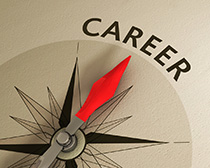Preparing for Interviewing
 The thought of interviewing for a job makes most of us nervous. The key to interviewing success is preparation. The more prepared you are, the more confident you will feel. We are going to break things down into bite-size pieces to help you get ready to interview with confidence.
The thought of interviewing for a job makes most of us nervous. The key to interviewing success is preparation. The more prepared you are, the more confident you will feel. We are going to break things down into bite-size pieces to help you get ready to interview with confidence.
Let’s talk about what you should do before, during and after the interview.
Before the Interview
Preparing before the interview is the most important step in performing well during the interview. The following tips will help you show the interviewer that you are the best person for the job.
Research the company! Knowing about a company’s products or services, mission, values and plans for the future can help you explain to the interviewer how you can do what the company needs. Some helpful resources for researching companies include:
- Company websites/Facebook pages/Twitter feeds
- Glassdoor
- The Muse
- Use the library for sources like Houston Business Journal and Reference USA
Prepare possible answers to common interview questions and a technique for answering behavioral interviewing questions ahead of time.
Practice answering interview questions:
- You can also ask a friend or family member to “interview” you and let you know how you’re doing.
- Come to Career Services for a mock (practice) interview.
At the end of the interview, you may be asked if you have any questions. Be sure to have 3-5 questions ready. Check here for good questions to ask.
You will need to look professional for the interview. Check here for help with this step.
Companies check social networking sites like Facebook to learn more about job candidates. Make sure there is nothing on any of your sites that you would not want an employer to see.
Bring to the interview: extra resumes on resume paper, list of professional references (also on resume paper), paper and pen. If possible, use a portfolio. Resume paper can be purchased at office supply stores, copy shops and Walmart/Target.
Have the interview location address, parking information and office phone number with you the day of the interview. Don’t rely on your smartphone to get you there - GPS is not always right. Allow extra drive time for traffic delays.
Get a good night’s sleep so you will feel rested and alert.
Arrive 10-15 minutes early for the interview.
Turn your cell phone off before checking in for the interview.
Types of Interviews
There any many different types of job interviews and every employer does it a bit differently. You may experience a combination of the following when interviewing for a job:
Phone screen. Human resources or the hiring manager may call to schedule an interview and “ask a few questions.” Be aware that the interview process has now started! Be prepared, polite and professional.
Phone Interview. Some employers will do an interview by phone first before scheduling an in-person interview. In some cases, a Human Resources representative may do the phone interview and then schedule an in-person interview with the hiring manager.
One-on-One Interview. This is where you and the interviewer meet in person to discuss the job and how well you fit the job requirements. You may interview with just one person or have a series of interviews with different people in the company.
Panel Interview. In this type of interview, you will meet with two or more interviewers at the same time.
Video Interview. You may be asked to interview by computer using a program like Skype, especially if the job you’re interviewing for is in another city, state or country.

During the Interview
You only get one chance to make a first impression. Keep the following in mind when interviewing:
- Use a firm handshake, make eye contact, smile and use your interviewer’s name (i.e., Ms. Sanchez, Mr. Jones) when greeting them.
- Keep your answers to questions short and focused.
- It’s OK to pause briefly before you reply if you need to time to think about your answer.
- If you don’t understand a question, ask for more information.
- Never say anything bad about a past employer, co-worker or customer.
- Do not ask questions regarding salary or benefits. Wait until a job offer has been made.
- At the end of the interview, let the interviewer know that you want the job (if you really do). Shake their hand, ask for a business card, ask when a hiring decision will be made and if you can follow up with them.
After the Interview
Congratulations, you have survived the interview! You still have a few important things to do:
1. Think about how you did in the interview. Write some notes on what you did well and what you could improve.
2. Within 24 hours, send a thank you email to everyone you interviewed with (you got their business cards so you’d have their addresses!). Thank them for their time and once again state your interest in the job.
3. Within 2 days, send a hand-written thank you note to all interviewers.
4. Follow up to find out the status of the position. If you asked the interviewer when and how to follow up, follow through. If you were not given a timeline, follow up by email or phone about 2 weeks after the interview.
5. Use the time you are waiting to hear back to decide if the job is really right for you. Will you be happy working there? Does it fit in with your career goals?
Check out more Career Resources to help you get ready for your next interview.

